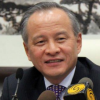Officials
Offical

Cui Tiankai presented his credentials as ambassador of the People’s Republic of China to the United States to President Barack Obama on April 15, 2013.
Cui was born in October 1952 in Ningbo, Zhejiang Province, near Shanghai. In the early 1970s, he spent five years as a farmhand during the Cultural Revolution, the period in which many urban Chinese were forced back to the land in a kind of spiritual cleansing effort by the Chinese Communist Party. Cui later became one of the first Chinese officials to speak of his experience during the Cultural Revolution.
He attended East China Normal University, studying foreign languages. After his 1979 graduation, Cui spent two more years at a special school for interpreters. This led in 1981 to his being assigned to the United Nations as an interpreter.
In 1984, Cui returned to China to serve as the third secretary in the International Organizations and Conferences department of the Ministry for Foreign Affairs. Cui returned to the United States in 1986 for postgraduate work at Johns Hopkins University. He earned his Master’s in Public Administration at Hopkins’ School of Advanced International Studies in 1987. He then returned to the International Organizations and Conference department and was named head of that department in 1988, a post he held for eight years.
Cui’s profile was raised in 1996 when he was named a deputy director and spokesman for China’s Foreign Affairs ministry. As such, he was a frequent source in Western media reports on China. In 1997, Cui was sent back to New York, this time as counselor in the Chinese mission to the UN.
In 1999, Cui returned to China to a position in the Policy Research Office, first as deputy director, then in 2001 as director. Cui moved to Foreign Affairs’ Asian Affairs Department in 2003 as director.
Cui was named assistant foreign affairs minister in 2006. One of his more prominent taks in that position was to participate in talks with Russia and Iran about Iran’s nuclear program.
In 2007, Cui took over as China’s ambassador to Japan. While in that job, he was outspoken on Japan’s role in World War II and some of its leaders’ attempts to downplay their country’s role as an aggressor in that conflict.
In 2010, Cui was named vice minister for Foreign Affairs. While there, at times he showed his ability to hew to the party line but in other instances he showed his skill in defusing tricky situations. When Chinese dissident Liu Xiaobo was named winner of the 2010 Nobel Peace Prize, Cui was outspoken in trying to intimidate other nations into boycotting the Nobel ceremony, an attempt that was mostly unsuccessful. However in 2012, when civil rights activist Chen Guangcheng took refuge in the U.S. Embassy in Beijing and eventually requested safe passage to the United States, Cui helped resolve the situation by allowing Chen’s departure from China.
Since taking his post in Washington, Cui has seemingly become immersed in American culture. He took his wife, Ni Peijun, to the Super Bowl last February and was photographed on the sidelines. In March 2014, he told a panel in Beijing “I have seen both seasons of ‘House of Cards,’ which I think embodies some of the characteristics and corruption that is present in American politics.”
Cui has a reputation as a troubleshooter. “Cui is very good to have at the center of U.S.-China relations,” said Kenneth G. Lieberthal, a senior fellow at the Brookings Institution. “That's not because he's pro-U.S. but because he’s a subtle and wide-ranging thinker. He represents China's interests and then understands what might be accomplished.”
Cui and his wife have a daughter.
-Steve Straehley
To Learn More:
Behind Scenes, China’s Envoy Aims to Allay Tensions With U.S. (by Jane Perlez, New York Times)
- Latest News
- D.C. Public Schools will Teach all Second-Graders to Ride a Bike
- New Rule in Germany Limits Sales of Sex-Themed E-Books to 10pm to 6am
- What Happened to the 6-Year-Old Tibetan Boy the Chinese Government Kidnapped 20 Years Ago?
- U.S. Ambassador to Turkey Photoshops his Hair Color to Mock Turkish Mayor
- Mystery Artist Calls Attention to Unfixed Potholes by Drawing Penises around Them





